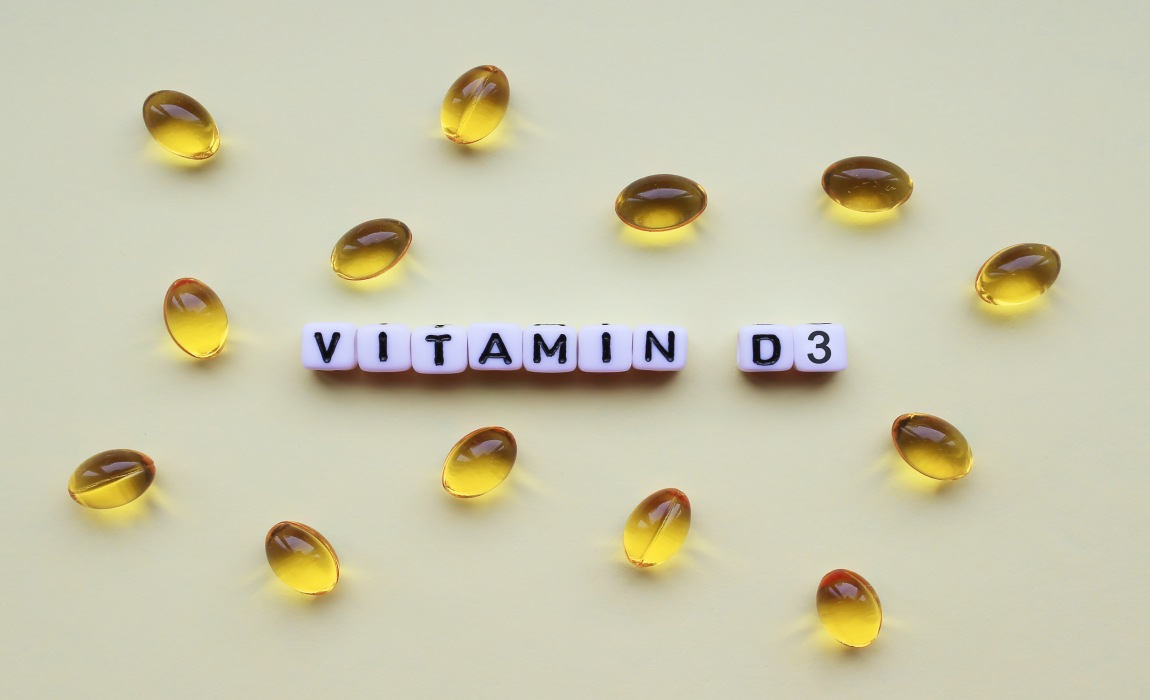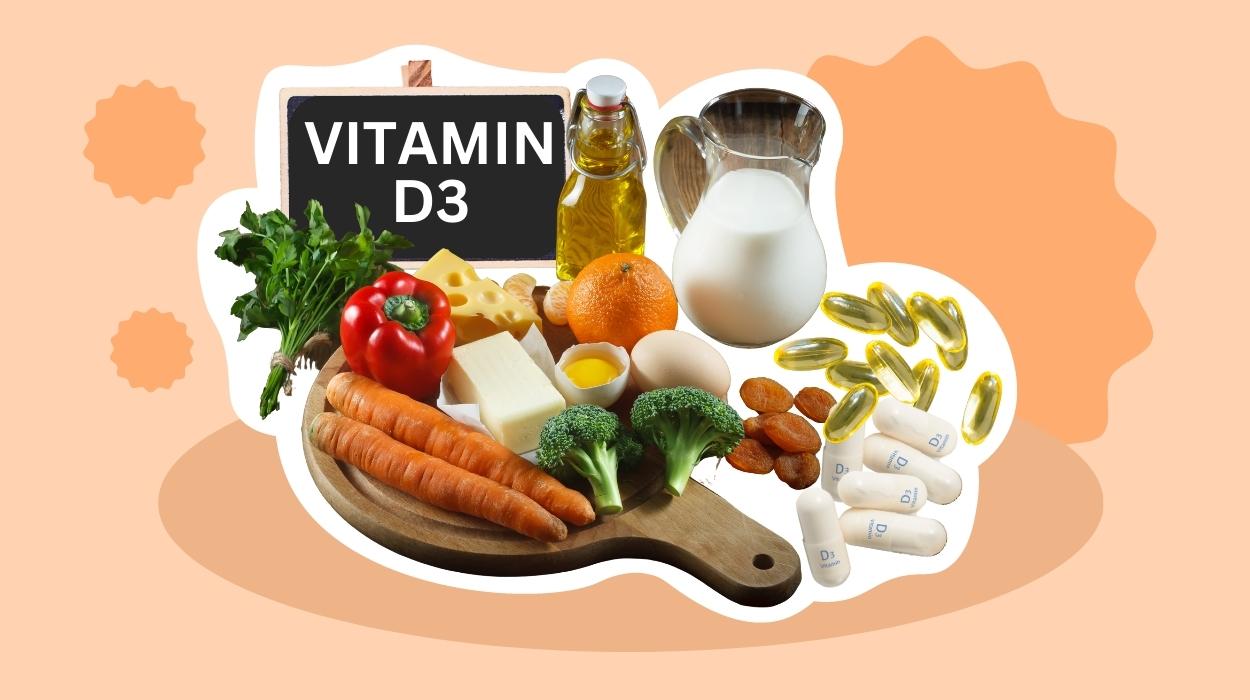Vitamin D3 is an essential fat-soluble vitamin that comes from certain animal foods, as well as from sun exposure, and can be taken in supplement form. Vitamin D3 helps the body absorb other essential vitamins and minerals that are necessary for not only bone health but also immunity, brain function, and mood. While most people are vitamin D3 deficient, it’s always best to get your levels checked with your doctor and discuss whether increasing vitamin D3 is right for you.
Vitamin D3 Benefits
- Disease Fighting Powers
- Improves Mood
- Can Help with Weight Loss
- May Improve Brain Function
- Lowers Risk for Type 2 Diabetes
- Strengthens Bones
7 Vitamin D3 Benefits Everyone Should Know

Disease Fighting Powers
Vitamin D3 plays a role in warding off many diseases, including multiple sclerosis, heart disease,[1] cancer, COVID-19, and autoimmune diseases such as rheumatoid arthritis and inflammatory bowel disease. In most of these conditions, vitamin D deficiency or low levels of enough vitamin D were associated with a greater risk of developing these conditions. Vitamin D3 has powerful protective properties for the immune system, which makes it essential for avoiding everything from the common cold to more serious, life-threatening conditions. Vitamin D3 specifically enhances immunity by encouraging T-cells to grow, the soldiers that attack pathogenic bacteria and viruses that could make us sick.
Improves Mood
If your mood improves when the sun’s out, you’re not imagining it. When rays from the sun come into contact with our skin, it initiates the production of vitamin D3, which helps our mood improve. This is why during winter months when it’s colder and darker, and we have lower levels of vitamin D, we’re more likely to experience seasonal affective disorder or SAD, a form of depression linked with less sunlight. Some studies suggest that lower levels of vitamin D may also lower levels of serotonin in the brain, which can also negatively affect our mood.
Can Help With Weight Loss
While research on vitamin D3 and weight loss is limited, studies have indicated that individuals who took vitamin D3 lost more weight than those who didn’t. The exact mechanism for why this might be is unclear, however, some scientists believe that vitamin D3, along with calcium, may help to suppress appetite. Research also suggests that those who are deficient in vitamin D may be more prone to obesity. It’s important to note that increasing vitamin D3 alone will not serve as a complete weight loss plan and that it would need to be done in conjunction with a healthy diet and exercise routine.
May Improve Brain Function
It’s common for aging people to have lower levels of vitamin D, as well as less cognitive sharpness. Research reveals that increasing vitamin D as we age (to stay within a normal range) may help improve cognitive function[2] and help prevent cognitive decline. Studies show that there is a direct cause-and-effect relationship between brain health and vitamin D, specifically that vitamin D works in the hippocampus region of the brain to facilitate healthy brain function as we age.
Lowers Risk For Type 2 Diabetes
Vitamin D3 may also play a role in how well we respond to insulin, the hormone that regulates our blood sugar. Studies show that those with vitamin D deficiency may be more prone to insulin resistance, in which the body does not respond to insulin as it should. Over time, this can lead to type 2 diabetes. With this in mind, if you’re pre-diabetic or have type 2 diabetes, know that this is reversible and one tool that could help, aside from eating a healthy diet and exercising, is addressing any vitamin D deficiency.
Strengthens Bones
When we think of strong bones, we think of calcium, not vitamin D3. But the reality is, we need vitamin D in order to absorb calcium properly. Without adequate calcium, our bones can become weak, and brittle and may break more easily. This is known as having low bow density. This is especially important for elderly individuals and women. As we age, it’s important to focus on quality foods that have healthy sources of vitamin D3 and calcium, and don’t forget, it’s perfectly acceptable to supplement as needed.
What Is Vitamin D3?

First, let’s clear up, what is vitamin D3 and how does it differ from vitamin D2? As you may have guessed, there are two types of vitamin D (D2 and D3).
Vitamin D2 (ergocalciferol) is found in plants and plant foods, as well as in supplement form. Vitamin D3 (cholecalciferol) is found in fortified foods as well as animal foods such as fish, cod liver oil, liver, and eggs. Vitamin D3 is also available in supplement form and most impressively, can be made inside the body when we are exposed to sunlight[3].
Vitamin D3 is a fat-soluble vitamin, which means it needs to be taken with a source of fat (avocado, olive oil, etc.) for the body to absorb it properly. This is why getting it from animal foods may be inherently beneficial – The food already contains fat. Many vitamin D3 supplements contain fat inside the capsule to help facilitate this process. Vitamin D3 works as an assistant in helping the body absorb other essential vitamins and minerals, such as calcium and phosphorus, which are needed for healthy bones. Vitamin D3 can be used both to prevent and treat bone disorders such as osteoporosis and serves us in several other ways.
Sources Of Vitamin D3
Vitamin D3 comes from many sources, including certain foods, the sun, and of course, dietary supplements. Let’s explore the options.
Sunlight
When the sun’s rays come into contact with the skin, it initiates a process that allows the body to create vitamin D3. This is why it’s advised not to shower right away after you’ve been outside, but rather, to give your skin time to fully soak in the sunlight. This happens through a chemical reaction in which the sun’s UVB rays interact with 7-DHC (a protein in our skin). This takes the inactive form of vitamin D and converts it to the active form, D3 so that the body can use it.
Supplements
As with most other vitamins and minerals, it’s easy to find vitamin D3 in the supplement aisle at any pharmacy or grocery store. Vitamin D3 comes in various dosages, which should be discussed with your doctor before taking, as well as forms – gummies, powders, drops, capsules and even chocolate candies infused with vitamin D3.
Oily Fish
Fish such as herring, sardines, and salmon are all excellent sources of vitamin D3. Make sure to get wild-caught fatty fish whenever possible and enjoy it with a side of vegetables.
Canned Tuna
Canned tuna is a convenient way to get some more vitamin D3 into your diet. Try to prioritize wild-caught tuna and make sure there are no extra ingredients in the can that don’t serve your health needs.
Cod Liver Oil
Cod liver oil, though not the most delicious, is a great source of vitamin D3. Luckily, it exists as a supplement – either a liquid that you can take in a quick spoonful or a capsule in which you won’t even taste it.
Liver
Beef liver, though again, not appealing to many, is one of the healthiest foods you can eat. It is rich in vitamin D3 and an excellent source of iron, as well.

Egg Yolk
Eggs may be well-known for their protein, but did you know the protein is mostly found in the whites of the eggs? The vitamins and minerals, including vitamin D3, are mostly found in the yolk.
Mushrooms
Mushrooms for the win! They have numerous phytonutrients with powerful medicinal properties, which is why they’re been used to treat and prevent a variety of health conditions. One such nutrient is vitamin D3. So eat up!
Fortified Foods (Milk, cereals, yogurt, OJ)
While milk, cereals, and other packaged foods don’t naturally contain vitamin D3, many of these products are now fortified with it. This means the vitamins have been added during the manufacturing process.
Possible Risks
As with any vitamin, you can overdo it and cause toxicity. Too much vitamin D supplements could cause a buildup of calcium in the blood. This may lead to symptoms like nausea and vomiting or frequent urination. If this continues too long, you may experience pain in your bones or kidney stones.
Always consult your doctor when taking vitamin D3 to ensure you’re taking the right amount for you, and get your levels checked periodically to make sure you’re not too high or too low.
When Is A Higher Vitamin D3 Intake Necessary?
Any vitamin D deficiency should be reason enough to increase your vitamin D so that you fall within normal levels. Low vitamin D would be anything below 30 nmol/l, and normal would be above 50 (but not to exceed 125 which would be too high). That being said, even if your vitamin D levels are low, you may have a unique circumstance in which you shouldn’t increase your levels. For this reason, it’s always ideal to discuss your situation with your doctor and ensure you are under medical supervision if they do recommend you begin taking Vitamin D. However, most individuals are lacking vitamin D supplementation and would likely benefit from bringing it higher into the normal range. Don’t guess-test! Your levels can be checked with a simple blood test ordered by any medical practitioner.
Conclusion
Vitamin D3 is one of two forms of vitamin D (the other is vitamin D2). Vitamin D3 naturally exists in certain foods (particularly animal-based foods) and can be made by the body when the skin is exposed to UVB rays from the sun. In addition to protecting our bones and boosting mood and cognition, vitamin D3 plays a key role in protecting us from harmful viruses and bacteria and keeping our immune system strong enough to prevent life-threatening cardiovascular disease. Vitamin D3 is easy to find in supplement form if getting it from food is not sufficient enough.
Frequently Asked Questions
A simple blood test from your doctor can show where your vitamin D levels are at. It’s important to know that you can have too much vitamin D, so while you don’t want to be deficient, you also don’t want to take too much, either. Let your lab results guide you.
In general, it’s always best to get your nutrients from food, however, it may not be possible to get the amount you need from food alone, in which case, adding a supplement can be helpful.
This is a tricky situation because, although the sun is a great source of vitamin D3, it can also be dangerous to sit in the sun for long periods without protection (it can lead to sun damage and skin cancer). Getting a little sunlight regularly is great, but take precautions and don’t overdo it.
 Expert's opinion
Expert's opinion
